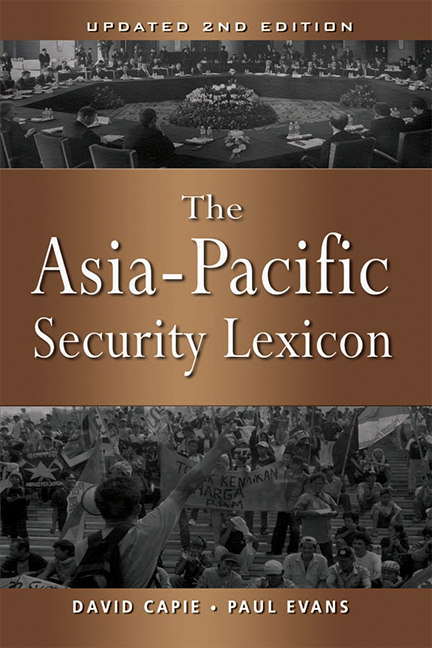Book contents
- Frontmatter
- Contents
- Abbreviations
- Introduction to the Second Edition
- Ad Hoc Multilateralism
- A la Carte Multilateralism
- The “ASEAN Way”
- Balance of Power
- Bilateralism
- Coalition of the Willing
- Coercive Diplomacy
- Collective Defence
- Collective Security
- Common Security
- Comprehensive Security
- Concert of Powers
- Concerted Unilateralism
- Confidence-Building Measures
- Confidence- and Security-Building Measures
- Constructive Intervention
- Cooperative Security
- Engagement
- Flexible Consensus
- Human Security
- Humanitarian Intervention
- Middle Power
- Multilateralism
- Mutual Security
- New Security Approach
- Non-Traditional Security
- Open Regionalism
- Peaceful Rise
- Pre-emption and Preventive War
- Preventive Diplomacy
- Security Community
- Terrorism
- Track One
- Track One-and-a-Half
- Track Two
- Track Three
- Transparency
- Trust-Building Measures
- About the Authors
Track One-and-a-Half
Published online by Cambridge University Press: 21 October 2015
- Frontmatter
- Contents
- Abbreviations
- Introduction to the Second Edition
- Ad Hoc Multilateralism
- A la Carte Multilateralism
- The “ASEAN Way”
- Balance of Power
- Bilateralism
- Coalition of the Willing
- Coercive Diplomacy
- Collective Defence
- Collective Security
- Common Security
- Comprehensive Security
- Concert of Powers
- Concerted Unilateralism
- Confidence-Building Measures
- Confidence- and Security-Building Measures
- Constructive Intervention
- Cooperative Security
- Engagement
- Flexible Consensus
- Human Security
- Humanitarian Intervention
- Middle Power
- Multilateralism
- Mutual Security
- New Security Approach
- Non-Traditional Security
- Open Regionalism
- Peaceful Rise
- Pre-emption and Preventive War
- Preventive Diplomacy
- Security Community
- Terrorism
- Track One
- Track One-and-a-Half
- Track Two
- Track Three
- Transparency
- Trust-Building Measures
- About the Authors
Summary
A term coined by Paul Dibb, then head of the Strategic and Defence Studies Centre (SDSC) at the Australian National University in Canberra. It was originally used in the context of a seminar sanctioned by the ASEAN Regional Forum (ARF) on regional confidence-building that took place in Canberra in November 1994. There are, however, at least two interpretations of the term's meaning operating in the region: one focusing on the content of the agendas, the other based on the background of the participants.
Based on content, the key question is “who sets the agenda?” According to this definition, Track One-and-a-half meetings are non-official meetings usually attended by officials (acting in their private capacities) and academics, where the agenda is set by the officials to focus on specific issues of concern to the official track (Track One). Examples of this include the Northeast Asia Cooperation Dialogue (NEACD) process and (confusingly) meetings that are often referred to as coming under the ARF's Track Two. To further complicate matters, at a meeting between Chinese and Canadian officials in 1998, one Chinese participant stated his view that the Council for Security Cooperation in the Asia Pacific (CSCAP) was a Track One-and-a-half institution. This approach perhaps suggests that regional security institutions have no fixed “track identity”. Whether CSCAP, for example, is a Track Two or a Track One-and-a-half institution, would presumably be a question of the content of the agenda at a given meeting.
A second meaning of the term hinges on the background of a meeting's participants. In this context, a Track One-and-a-half meeting is an unofficial meeting dominated by officials participating in their private capacities. For example, while the Canberra seminar mentioned above was unofficial (the channel usually referred to as Track Two), most of the participants were military personnel or government officials from ARF member states, not academics, journalists, or analysts from regional policy institutes.
- Type
- Chapter
- Information
- The Asia-Pacific Security Lexicon (Upated 2nd Edition) , pp. 231 - 232Publisher: ISEAS–Yusof Ishak InstitutePrint publication year: 2007



